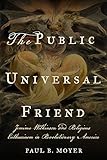The Public Universal Friend : Jemima Wilkinson and Religious Enthusiasm in Revolutionary America / Paul B. Moyer.
Material type: TextPublisher: Ithaca, NY : Cornell University Press, [2015]Copyright date: ©2015Description: 1 online resource (280 p.) : 11 halftones, 3 mapsContent type:
TextPublisher: Ithaca, NY : Cornell University Press, [2015]Copyright date: ©2015Description: 1 online resource (280 p.) : 11 halftones, 3 mapsContent type: - 9781501701450
- Women and religion -- United States -- History -- 18th century
- Women evangelists -- United States -- Biography
- Women religious leaders -- United States -- Biography
- Biography & Autobiography
- U.S. History
- HISTORY / United States / State & Local / Middle Atlantic (DC, DE, MD, NJ, NY, PA)
- political innovation, social transformation, Jemima Wilkinson, religious enthusiasm, Revolutionary America, American Revolution, religious upheaval, millenarian movements, Penn Yan, New York, American religious history
- 289.9 23
- BR1719.W5 M69 2016
- online - DeGruyter
| Item type | Current library | Call number | URL | Status | Notes | Barcode | |
|---|---|---|---|---|---|---|---|
 eBook
eBook
|
Biblioteca "Angelicum" Pont. Univ. S.Tommaso d'Aquino Nuvola online | online - DeGruyter (Browse shelf(Opens below)) | Online access | Not for loan (Accesso limitato) | Accesso per gli utenti autorizzati / Access for authorized users | (dgr)9781501701450 |
Browsing Biblioteca "Angelicum" Pont. Univ. S.Tommaso d'Aquino shelves, Shelving location: Nuvola online Close shelf browser (Hides shelf browser)
Frontmatter -- Contents -- List of Maps and Figures -- Acknowledgments -- Introduction -- 1. Genesis -- 2. Numbers -- 3. Revelation -- 4. Chronicles -- 5. Exodus -- 6. Acts -- 7. Judges -- Epilogue -- A Note on Sources -- Notes -- Bibliography -- Index
restricted access online access with authorization star
http://purl.org/coar/access_right/c_16ec
Amid political innovation and social transformation, Revolutionary America was also fertile ground for religious upheaval, as self-proclaimed visionaries and prophets established new religious sects throughout the emerging nation. Among the most influential and controversial of these figures was Jemima Wilkinson. Born in 1752 and raised in a Quaker household in Cumberland, Rhode Island, Wilkinson began her ministry dramatically in 1776 when, in the midst of an illness, she announced her own death and reincarnation as the Public Universal Friend, a heaven-sent prophet who was neither female nor male. In The Public Universal Friend, Paul B. Moyer tells the story of Wilkinson and her remarkable church, the Society of Universal Friends.Wilkinson’s message was a simple one: humankind stood on the brink of the Apocalypse, but salvation was available to all who accepted God’s grace and the authority of his prophet: the Public Universal Friend. Wilkinson preached widely in southern New England and Pennsylvania, attracted hundreds of devoted followers, formed them into a religious sect, and, by the late 1780s, had led her converts to the backcountry of the newly formed United States, where they established a religious community near present-day Penn Yan, New York. Even this remote spot did not provide a safe haven for Wilkinson and her followers as they awaited the Millennium. Disputes from within and without dogged the sect, and many disciples drifted away or turned against the Friend. After Wilkinson’s "second" and final death in 1819, the Society rapidly fell into decline and, by the mid-nineteenth century, ceased to exist. The prophet’s ministry spanned the American Revolution and shaped the nation’s religious landscape during the unquiet interlude between the first and second Great Awakenings. The life of the Public Universal Friend and the Friend’s church offer important insights about changes to religious life, gender, and society during this formative period. The Public Universal Friend is an elegantly written and comprehensive history of an important and too little known figure in the spiritual landscape of early America.
Mode of access: Internet via World Wide Web.
In English.
Description based on online resource; title from PDF title page (publisher's Web site, viewed 26. Apr 2024)









